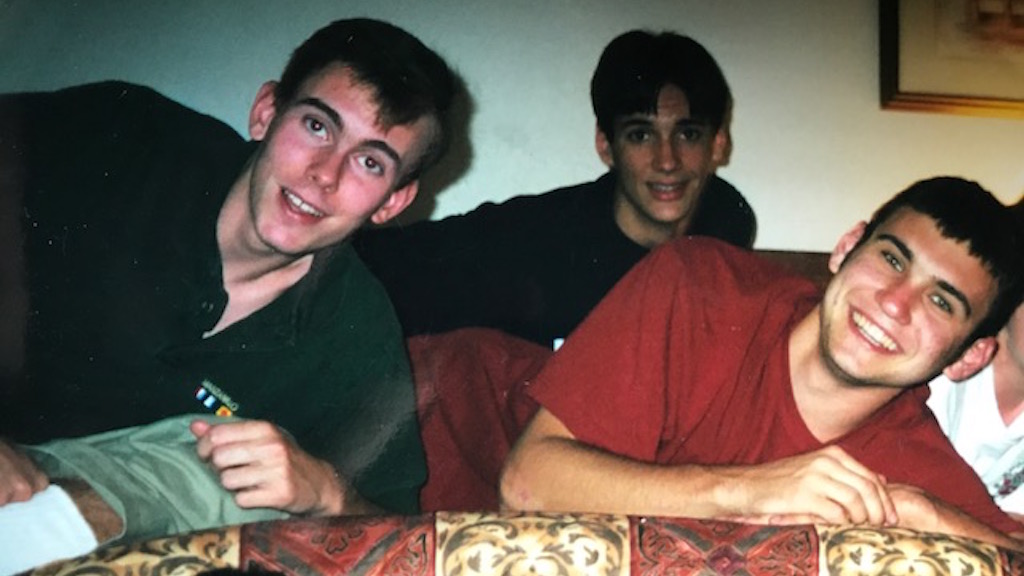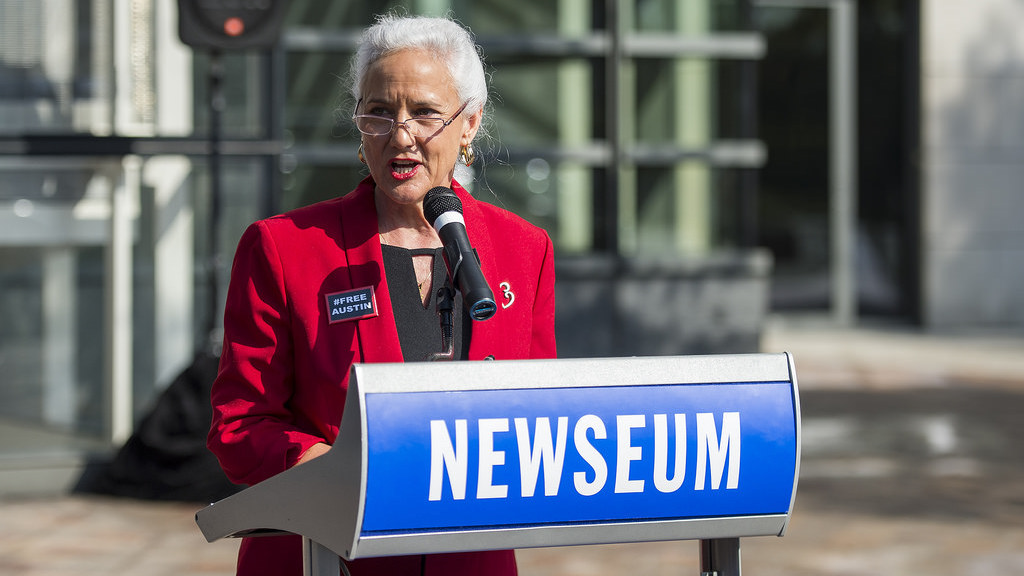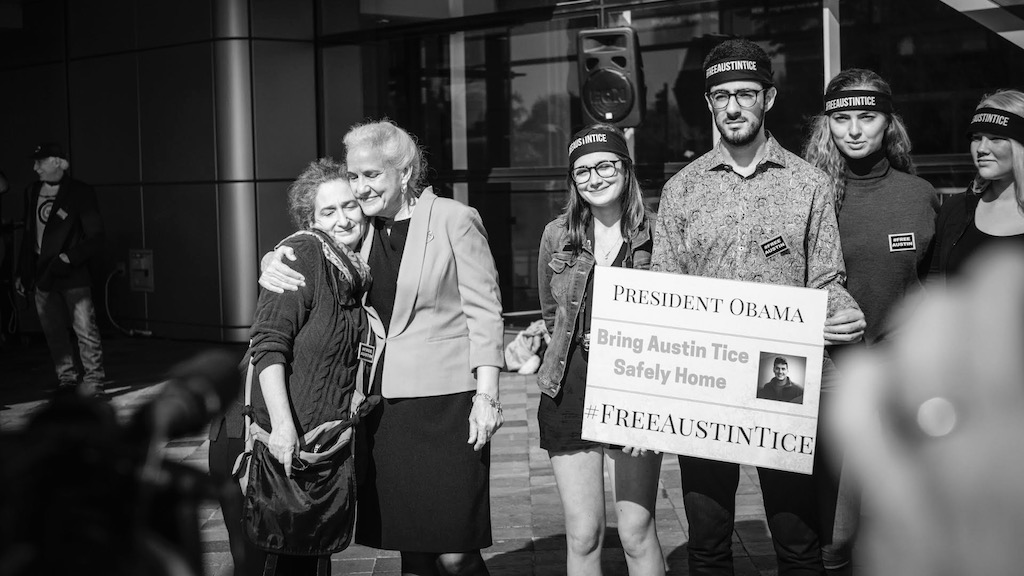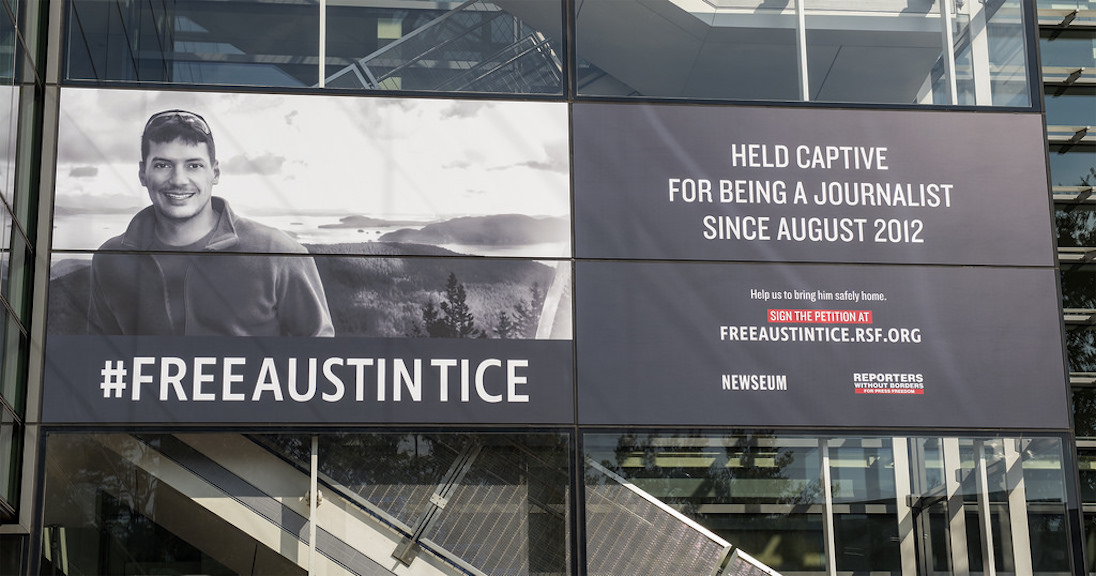It’s been five years since Austin Tice, a freelance journalist and Georgetown Law student, went missing while reporting in Syria. Ask his classmates, though, and they remember Tice as though he never left.
“What I liked about Austin is that he was never afraid of expressing what was on his mind, which was outrageous at times,” says Ed Safaryan, who became close with Tice when they both were on the rowing team as undergraduate students at Georgetown. “He was very vocal, he was very outgoing, but also very unabashed about what he thought was right and believed in.”
Beyond being a “bright, brilliant guy,” Safaryan remembers Tice as someone who would talk as freely of his unabashed love of Taylor Swift as he did of his ambitious plans to enroll in the Marines after college. “He’s not your typical white dude from Georgetown who rowed crew,” as Safaryan puts it.

“He was a very organized, very gregarious, very warm guy,” says Mark Nabong, who was a classmate of Tice’s at Georgetown Law. “He was a connector. He was one of those guys that made sure he connected with you.”
While Tice is still top-of-mind to his friends and family, his disappearance only gets occasional headlines five years on. In August 2012, Tice was one of the first of several Western journalists kidnapped while reporting on the Syrian Civil War as tensions intensified between rebel forces and the government of President Bashar al-Assad. A few months after Tice disappeared, another journalist, James Foley, was kidnapped by the group that eventually became known as the Islamic State in Iraq and Syria and released footage of his gruesome beheading less than two years later. Other Americans, including aid worker Kayla Mueller and freelance journalist Steven Sotloff, suffered the same fate as Foley.
At the time of Tice’s disappearance, the State Department said it believed he was a captive of the Assad regime. But in the five years since that announcement, the only evidence he is still alive has come from a YouTube video, in which he appears blindfolded and surrounded by men armed with rifles, released about six weeks after he went missing.

Chatter about Tice’s situation has picked up in recent months. In June, the New York Times reported on the CIA’s recent failed negotiations with the Syrian national intelligence service to bring Tice home. Last month, Tice’s parents, Marc and Debra, held a news conference in Beirut, appealing to both the US and Syrian governments to bring their son home. In an subsequent interview with Today, they said they know Austin is alive.
Like many of his Western colleagues in Syria, Tice had decided to go to the Middle East after the Arab Spring because he thought it was important that US audiences know what people were fighting for. Once in Syria, Tice quickly started picking up freelance assignments from McClatchy and the Washington Post. Tice relished the opportunity to be on the front lines of the civil war. In a Facebook post that circulated after his disappearance, he wrote that he went to Syria in search of the “pioneering spirit” that he believed Americans had lost. Of the Syrian people, Tice wrote, “They realize there are things worth fighting for, and instead of sitting around wringing their hands about it, or asking their lawyer to file an injunction about it, they’re out there just doing it.”
Mark Seibel, now a national security editor at BuzzFeed News, was one of the first editors to pick up Tice’s work back in 2012, when he was working in McClatchy’s DC bureau. Seibel says that Tice’s military background helped him report on a complex conflict—marked by countless warring factions and competing interests—in a nuanced way that other journalists did not.
“Because he had a military background, he actually understood the stuff he was looking at and seeing,” Seibel says. “And that was important. Austin brought us some knowledgeable reporting from the ground. It had the feeling of being both authentic and authoritative.”
On August 11, Tice tweeted that he had celebrated his birthday at a pool party with members of the Free Syrian Army.
Spent the day at an FSA pool party with music by @taylorswift13. They even brought me whiskey. Hands down, best birthday ever.
— Austin Tice (@Austin_Tice) August 11, 2012
“He seemed to be very cool and content about where he was,” says Safaryan, who communicated with Tice via Facebook up until his disappearance. “He enjoyed feeding off the energy of people that are fighting for freedom… He was there to shed light on the problem.”
On August 14, Tice was gone.
Just before he disappeared, Tice was in the city of Darayya working on a story for the Post, but was planning on leaving soon for Beirut, Seibel recalls. “I kick myself over the Austin situation,” he says. “Even though we talked every day, I did not … really understand how he intended to extricate himself from Syria. That’s a security gap there—we should have been talking about that sort of thing so we knew what the plan was, how it would be executed, what could go wrong.”
Delphine Halgand, the US director of Reporters Without Borders, has been working on Tice’s case since the beginning, and grown close with the Tice family in the process.
“The parents are amazingly strong, but five years is long,” she says. Tice has six brothers and sisters—and now, a niece and nephew—waiting for him in at home in Houston. Tice was 31 when he left; he turned 36 on Friday.
“Those are beautiful years that are stolen,” Halgand says.
The country that Tice left has changed dramatically in the past five years, including in how its government addresses hostage situations. After ISIS murdered Foley in 2014, the Obama Administration initiated a comprehensive review that resulted in the creation of a hostage-recovery “fusion cell”, and the appointment of a special presidential envoy for hostage affairs (a position that has not yet been filled under the Trump administration).
Halgand says that thanks to the new unit, there has been a dramatic change in the way the government works with families like the Tices. The State Department and FBI communicate better with each another about the state of hostage cases, and families no longer feel they have to keep quiet about their loved ones, or refrain from negotiating with captors. “The big improvement in policy is that the agencies talk together,” Halgand says. “The government shares more information with families. They work as a team.”
The United States’ strict no-concessions policy, which prohibits officials from paying ransom to captors, has not changed.

Tice’s situation continues to resonate at Georgetown. After finding out about Tice’s disappearance, Barbara Feinman Todd, the director of Georgetown’s journalism program, arranged for his family to speak to current students on campus. The journalism school has also hosted letter-writing campaigns and held demonstrations in front of the White House, while the bar association at Georgetown Law passed a resolution in support of the former student last year.
“When you go through four years at Georgetown, you have a set of shared experiences and values, and that bond is really powerful,” says Ari Goldstein, a senior studying government. “Austin’s story is important and impactful. He represents the best of American values…he was willing to put his life on the line in pursuit of justice and truth.”
Todd hopes the school’s efforts will drive home a message that “journalism matters.”
“I want the students to really care about journalism and to know it’s important, and that it’s a noble profession,” she says, “but to also be aware of the risks that some types of coverage entail.”
Safaryan, for one, thinks his friend knew full and well that he was entering a risky part of the world when he left for Syria. But it was his zest for life that propelled him. “He loved life,” Safaryan says, adding that Tice left for Syria because he wanted to be among people who valued life so much, they would risk nearly certain death to fight for it.
“Life and freedom mean more to these people than anyone,” he says. “They were all fighting to survive.”



















